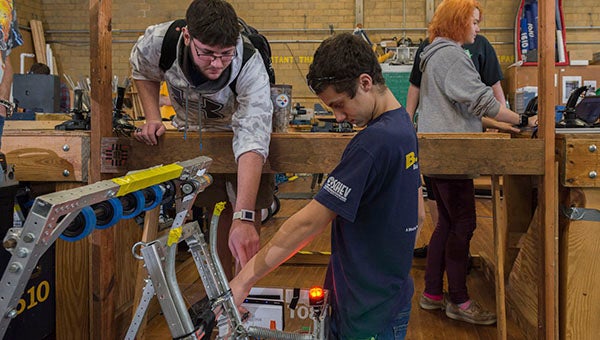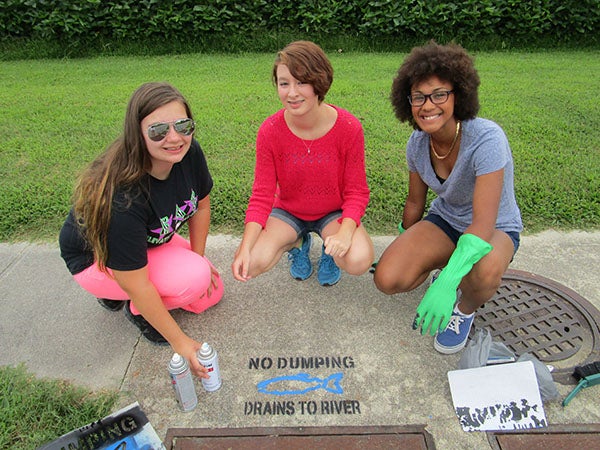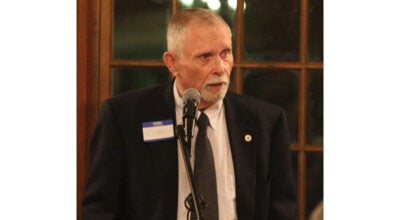Parents concerned with gifted program changes at FCPS
Published 11:05 am Friday, January 30, 2015

Student Donald Wintersteen, right, explains functions of last year’s robot to a member of a visiting team at the recent Robotics Kickoff. With the reduction of one of the system’s two gifted instructors, parents are worried about the future of Franklin City Public School’s after-school gifted programs, such as the Robotics Team and Community Problem Solvers. The CPS team was awarded $15,000 to help bring recycling to Downtown Franklin.
FRANKLIN
After learning that the Franklin City Public School system had cut a position in the gifted program following a retirement, many parents became outraged.
Kathryn Conner, a teacher’s aide at S.P. Morton Elementary School, has had five of her children either go through the gifted program, or the children are currently involved. When J.P. King Jr. Middle School’s Patti Rabil decided to retire, she was disappointed because of the impact the Type II instructor had on Conner’s older daughters. But she understood Rabil’s family reasons.

From left to right, Angela Bird, Vanessa Stone and Summer Winston of Project Pollution Preventers, the Community Project Solvers team tackling recycling downtown. Over the summer, they were also concerned with drainage entering the river, which exits into the ocean, where trash builds up and endangers wildlife. Parents worry that the future of this program is in jepardy after the system reduced one of the system’s two gifted instructors.
“Her talents and skills are known worldwide, and I do not exaggerate when I say that,” she wrote in a statement partially delivered at a previous board meeting, adding that the organizations Rabil mentored competed on an international level and won. She was only able to partially give the statement because some of what she wanted to say was shut down by the chair due to Citizens’ Time rules, which don’t allow community members to talk about issues deemed personnel.
“On a most personal level — I have seen this in effect in my own children, especially Katie, whose seventh-grade Community Problem Solvers team project Disaster WatchDogs for Hurricane Preparedness won Grand Champion and her individual CmPS project on vaccines as a senior earned her First Place at Internationals and led to a full tuition Honors Program scholarship at Virginia Tech.”
Following Rabil’s departure in December, Conner heard some hopeful news, that Rabil was willing to continue to work with Franklin City Public Schools on a part-time basis as a gifted teacher in order to continue the program. However, the system did not create a part-time position. Instead, the full-time position would also be cut.
Liz Burgess, who served as the gifted teacher at S.P. Morton Elementary School and Lead Teacher, became the Gifted Coordinator for all three schools.
The Lead Teacher positions, of which Rabil was also one, were dropped at both schools, which are striving to regain full accreditation status.
Lead Teachers do a little bit of everything and are partially tasked with doing a lot of the administrative work, so teachers can focus on students in the classroom.
“I greatly disapprove of this plan and feel it is detrimental to not just the Gifted Program, but to the school system as a whole as well,” Conner said. “How is it a good idea to NOT have this position filled at our two at-risk schools right now? Each task could be parsed out to various other administrators or teachers, but everyone is working endlessly at their own responsibilities to turn the schools back on track.”
The other question was how one person could handle the Robotics Program, Future Problem Solvers and Community Problem Solvers, all of which have won big accolades for the system. One note mentioned is that Robotics and FPS meet at the same time and have a similar competition schedule.
“The same problem I mentioned for lead teachers applies here again,” Conner said. “Saying yes to more responsibilities will decrease the performance of something somewhere.”
She wondered about the fate of these programs and who would decide which ones to cut. Will it be the “FPS teams who win awards annually at State Bowl and consistently attend International Conference and perform strongly there as well? Or is it the Robotics Team that has won Rookie of the Year in its inaugural competition, and then won State Regionals three more times in the past eight years and went on to compete at World Championships?” Conner asked.
“Or is it P3 — the current CmPS team that has worked for a year and a half increasing awareness in the community about pollution and then has worked tirelessly to devise and implement better recycling efforts made possible mostly through a $15,000 grant from the community, which of course would have to be returned if the project is not seen to completion — a completion which we fully expect to result in State Bowl success and a strong showing at the 2015 international competition.
“Tell me, which group of high-end achieving students are you planning to let down?”
Burgess also runs several programs at SPM, including but not limited to recycling, safety patrol and the LEGO League.
Conner wasn’t alone. Teri Zurfluh lives in Courtland, but pays to send her children to the Franklin City Public School system because of the gifted program. She isn’t sure if it is worth it anymore.
Students and former students have also spoken out against it, including the aforementioned Katie Conner, who said the gifted program helped her earn $100,000 in scholarships.
Business leaders came out, too. Dan Howe has been working with the Community Problem Solvers for the past couple of years, and his sons went through Franklin’s gifted program and have gone on to be successful businessmen.
“We’ve spent years working on recycling in the downtown district,” Howe said. “And these students less than half my age — one-third my age, even — managed to do that.”
He didn’t see how one person could pull off all three programs.
“I would be greatly disappointed to see a program like that discontinued,” Howe said of Community Problem Solvers. “You can’t get better volunteers than youth proud about going forward in life.”
Middle school teacher Mollie Strozier was even worried about the Lead Teacher position. The support, including helping with lesson plans, analyzing data and critiques through observation really helped improve the teaching done in the classroom. To her, it had a definite impact on student performance.
Strozier wasn’t able to use Rabil’s name in the meeting, but she said there was a gifted teacher while she was at J.P. King who helped bring her out academically. Rabil has been in the system since the 1980s, when she started the gifted program as it is today.
“I frequently found school boring,” Strozier said, adding that most classes did not challenge her. “But this teachers provided opportunities to make it more interesting. She helped prepare me for college. I was an honor graduate at Virginia Tech.”
Now that her father has passed away, Rabil said, she needed to be with her mother more. But she wasn’t ready to give up education and has been disappointed with the way this has turned out.
Going forward, she hopes to see the position of Lead Teacher, or something similar, return to the two schools where it was cut. There continues to be a Lead Teacher at Franklin High School.
“I think they were a great benefit to the faculty, the students and in the buildings,” Rabil said. “This is a time, where we need strong support of people who know what has to be done — they understand the entire spectrum of school improvement.”
As for P3, the Project Pollution Preventers, Rabil was able to say that this program will continue, but no thanks to the schools. The City of Franklin and the charities will step up to the plate to see this project completed.
The future of Community Problem Solvers as a whole was less clear.
“I don’t know,” Rabil said about if it would continue. “The kids are in different grades and they come up with the project out of school. This one just started out with a study on ‘Ocean Soup’ two years ago, and the kids have just been amazing with it. They think globally, and act locally.”
Whether Community Problem Solvers will continue beyond the current series was a question that the Franklin City Public School system chose not to answer. The administration wouldn’t lay out how Burgess would be able to effectively lead all three programs and her elementary school programs, citing personnel.
They didn’t answer whether the middle school or elementary school would get more support for teachers in absence of Lead Teachers. Leadership declined to respond to the question of how many gifted students one teacher was being expected to lead.
Instead, Dr. Willie J. Bell Jr., superintendent, released a statement but declined to respond further.
“The instructional vision does not speak of reducing teachers or school programs, but a continued laser-like focus on student achievement,” Bell said. “However, when staff retirements are submitted to our attention, we then make staff adjustments to continue to better serve all 1,115 students during the instructional day and after-school as well. We will continue to push forward for success of all students.”
Conner didn’t see it the same way, however. Serving on the advisory council for schools, she has played a role in developing the system’s vision. That vision, still a work in progress, states: FCPS is dedicated to delivering excellence to ensure that every student is college, career, and citizen ready in a 21st-century learning environment.
She responded, “If you follow through with the current plan with a lack of Lead Teachers, scaling down the gifted program and endangering the many other programs in place that are designed to benefit EVERY student, gifted or not, to be successful in their chosen path in life….then you have failed EVERY student in our school system.”





